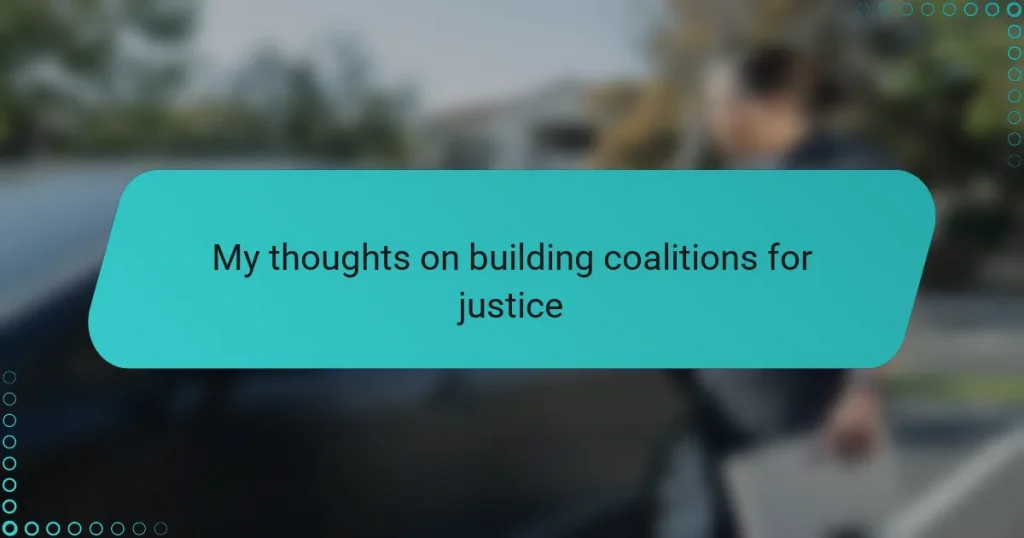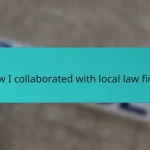Key takeaways
- Coalitions amplify voices and unite diverse skills, creating stronger advocacy and innovative solutions.
- Essential steps to forming effective coalitions include identifying aligned partners, setting clear goals, and maintaining open communication.
- Strategies for effective collaboration involve fostering honest dialogue, defining roles, and nurturing flexibility to adapt to challenges.
- Overcoming coalition challenges relies on transparent conflict resolution, celebrating small victories, and streamlining decision-making processes.
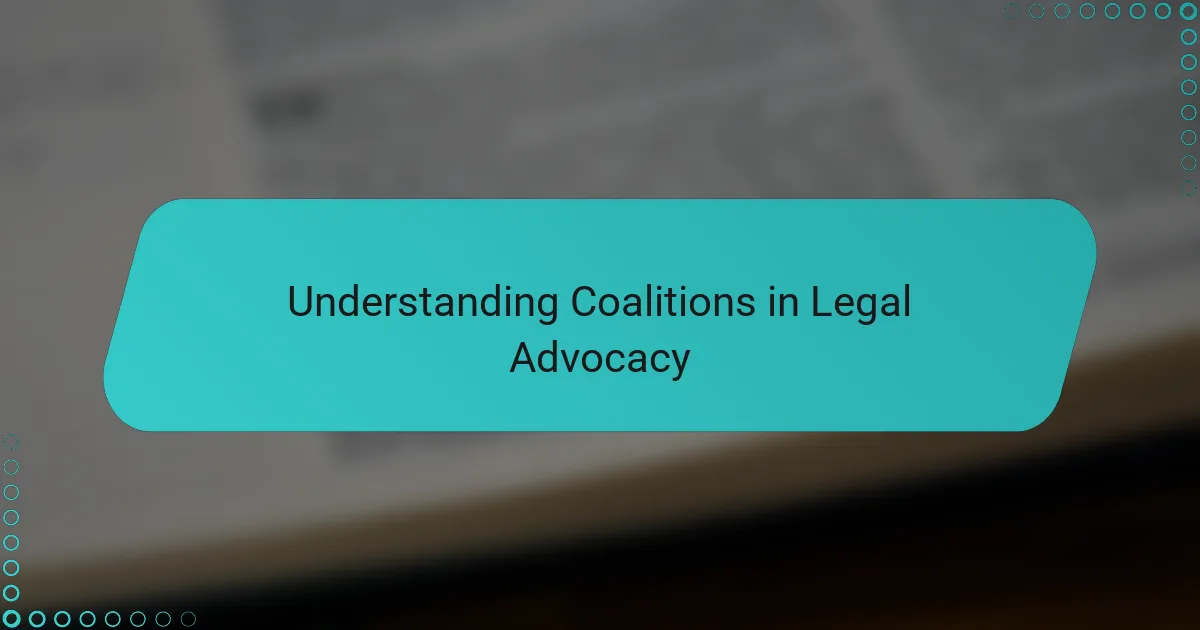
Understanding Coalitions in Legal Advocacy
When I first joined a legal advocacy coalition, I quickly realized it’s not just about pooling resources—it’s about uniting diverse voices around a shared goal. Have you ever noticed how powerful a group can feel when everyone’s passion and perspective come together? That energy can shape real change in ways solo efforts rarely do.
In my experience, understanding coalitions means appreciating the delicate balance of trust and communication. It’s not always easy; conflicts arise when priorities clash or when members feel unheard. But I’ve found that navigating these challenges honestly strengthens the coalition and deepens our collective commitment to justice.
What I find most compelling is how coalitions mirror the very justice they seek: inclusive, collaborative, and resilient. They remind me that advocacy is rarely a solo journey. Instead, it’s a tapestry woven from many threads, each essential to the final picture of change we aim to create.
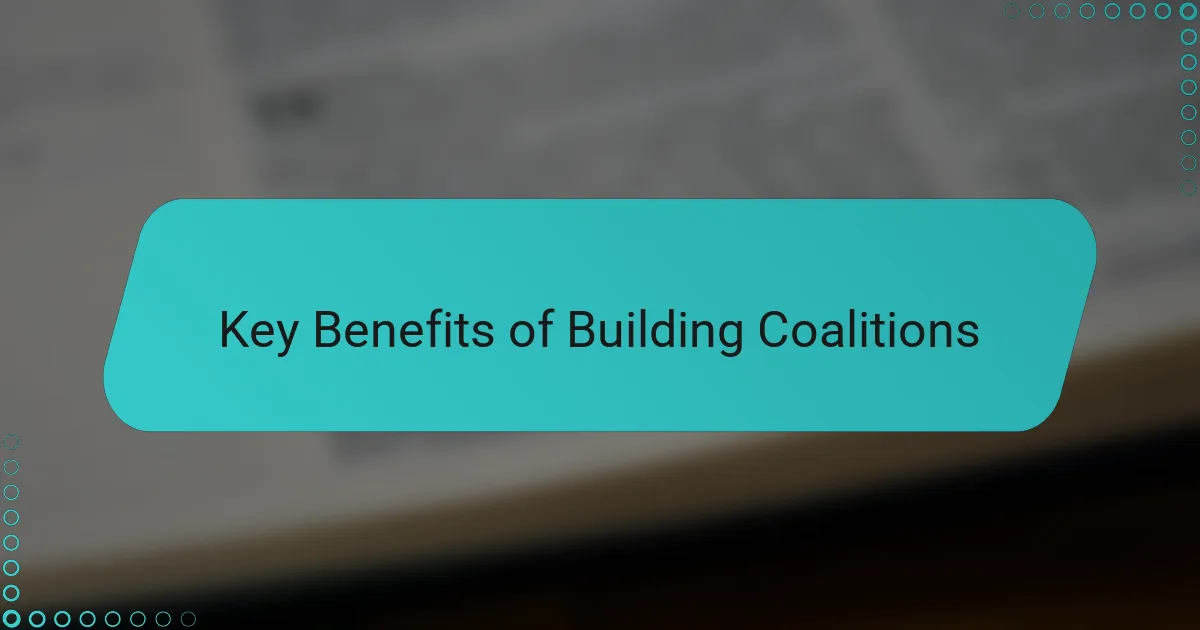
Key Benefits of Building Coalitions
One key benefit I’ve witnessed firsthand is the amplification of voices. When individuals who might feel unheard come together, their shared message gains a clarity and strength that commands attention. Have you ever felt the difference between speaking alone and speaking with a crowd behind you? That collective power can tilt the scales in ways I’ve rarely seen solo advocates achieve.
Another advantage is the pooling of diverse skills and perspectives. In one coalition I worked with, a lawyer’s sharp legal mind paired perfectly with activists’ grassroots experience, creating strategies none of us could have devised alone. This blend of expertise not only broadens our approach but also makes solutions more creative and robust.
Lastly, building coalitions fosters a sense of solidarity that sustains momentum even during tough times. When discouragement creeps in, knowing that a group stands by your side reignites my passion and keeps the commitment alive. Isn’t it easier to persevere when you feel part of something bigger than yourself? That emotional backbone is essential in the long, often grueling fight for justice.
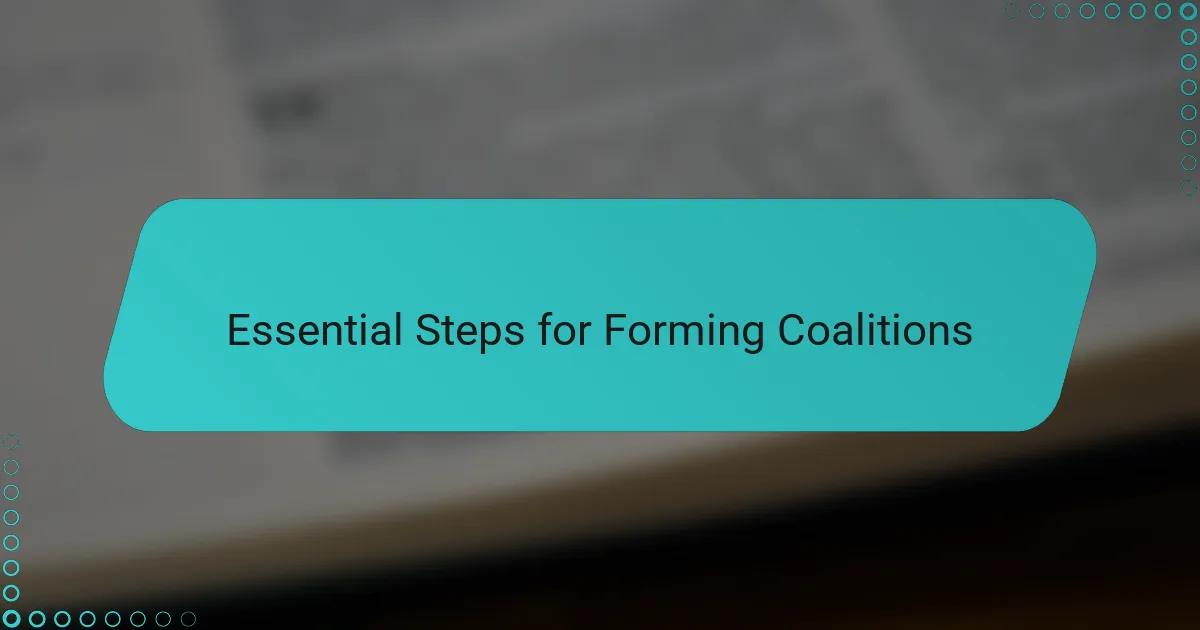
Essential Steps for Forming Coalitions
The first vital step I believe in is identifying partners who genuinely share your commitment to justice. It’s tempting to gather as many allies as possible, but I’ve learned that alignment in values and goals creates a stronger foundation. When I took time to connect deeply with potential coalition members, the trust we built early on made challenging conversations feel less daunting later.
Next, setting clear, collective goals can’t be overlooked. I’ve seen coalitions flounder when members are unclear about what success looks like. Have you ever been part of a group where everyone seemed to be pulling in different directions? Defining shared objectives upfront helps keep everyone focused and motivated—this clarity fuels the collective energy I cherish in advocacy work.
Finally, establishing open communication channels is crucial for sustaining the coalition’s health. From my experience, regular check-ins and transparent dialogue prevent misunderstandings from festering. It also creates space for members to voice concerns or ideas, which nurtures a sense of belonging and shared ownership. Isn’t it amazing how simply feeling heard can empower a coalition to reach new heights?
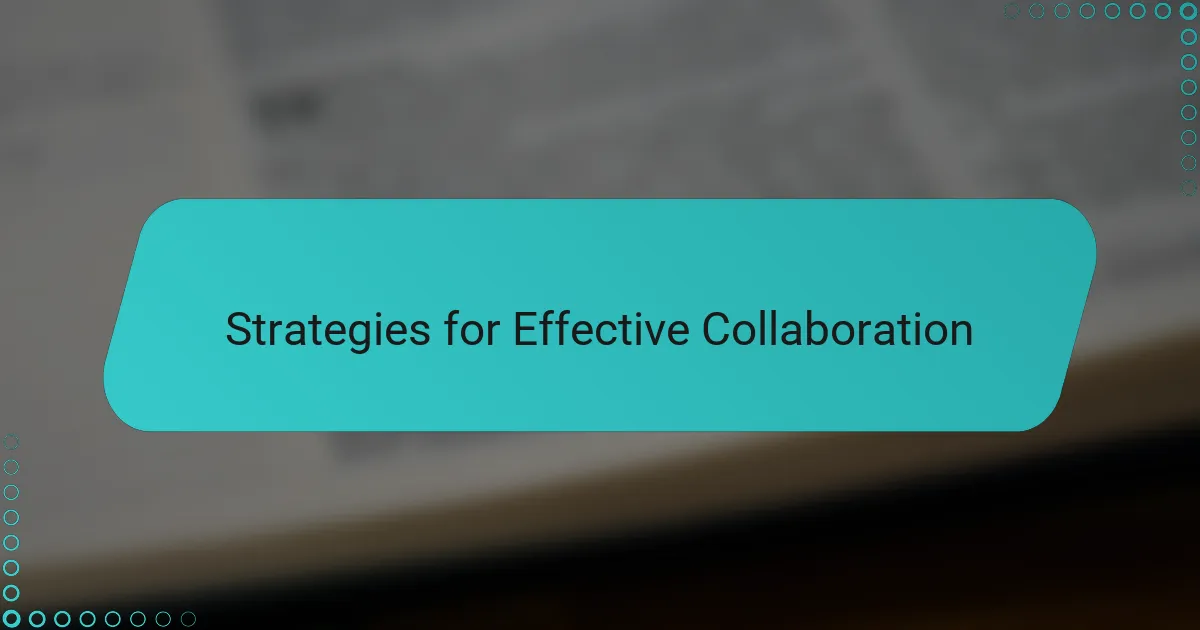
Strategies for Effective Collaboration
One strategy I’ve found indispensable is creating intentional spaces for honest dialogue. When coalition members feel safe to express doubts or disagreements without fear of judgment, the collaboration deepens. Have you ever noticed how a single candid conversation can transform tension into trust? That openness lays the groundwork for real teamwork.
Another approach involves clearly defining roles based on each member’s unique strengths. Early on, I saw how confusion about responsibilities slowed progress and sparked frustration. But once we matched tasks to expertise and passion, the coalition’s rhythm improved dramatically. It makes me wonder, how much smoother could your coalition run if everyone knew exactly where they fit?
Lastly, I believe nurturing flexibility within the coalition is key. Justice work is unpredictable, and clinging too rigidly to plans can stifle innovation or alienate members. I’ve learned that when we adapt strategies together, we stay resilient and responsive—qualities essential for lasting impact. Isn’t it empowering to work with people who can pivot gracefully rather than crumble under pressure?
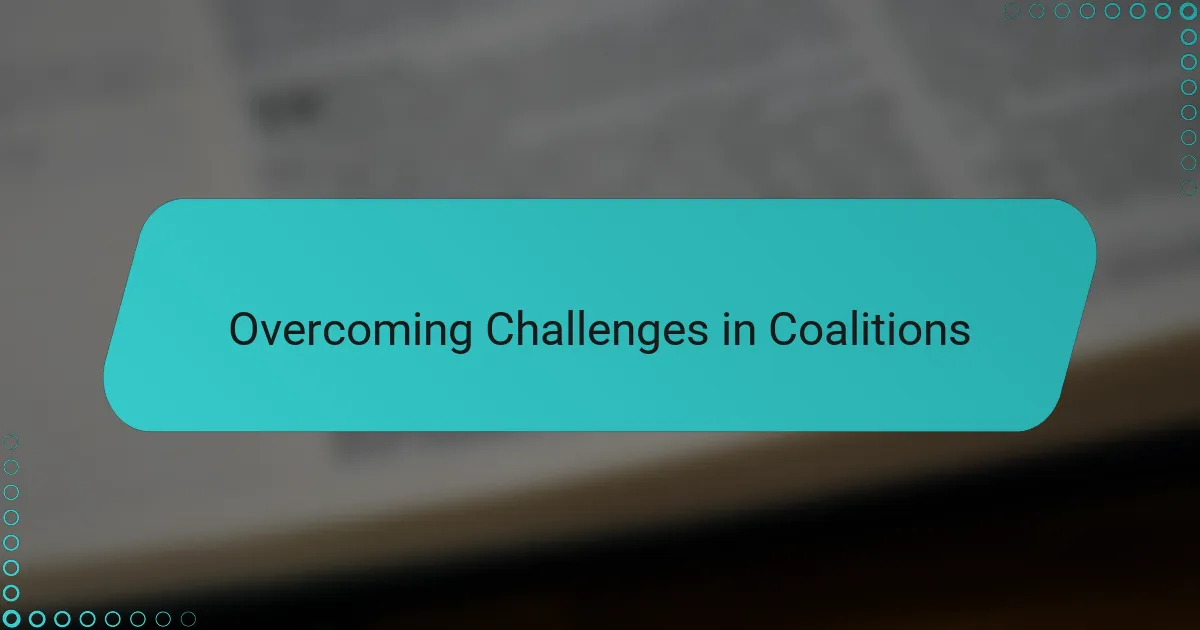
Overcoming Challenges in Coalitions
Challenges in coalitions often arise from differing perspectives and priorities. I remember a time when a heated disagreement threatened to stall our efforts, but by acknowledging each member’s concerns openly, we found common ground. Have you ever seen how confronting tension honestly can actually deepen trust rather than break it?
Another obstacle I frequently encounter is the struggle to maintain consistent engagement. People’s time and energy fluctuate, especially when progress feels slow. To overcome this, I try to celebrate small victories regularly—those moments of forward motion keep morale alive and remind us why we’re in this fight together.
Sometimes, decision-making processes get bogged down by the sheer number of voices. It’s tempting to want everyone’s input on every detail, but I’ve learned that setting clear protocols for decisions prevents paralysis. Have you ever been in a meeting that seemed endless? Streamlining how choices are made helps coalitions keep momentum without sacrificing inclusiveness.
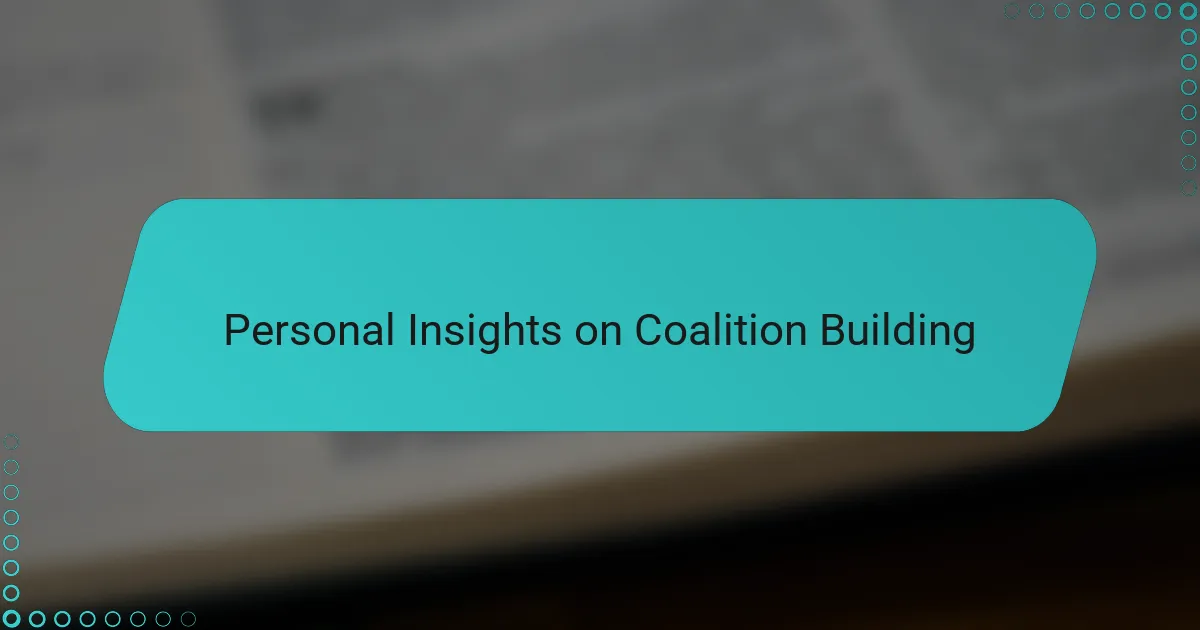
Personal Insights on Coalition Building
Building coalitions for justice has taught me that vulnerability is an unexpected strength. When I first admitted my uncertainties to the group, it opened the door for others to share their fears too. Isn’t it fascinating how showing our imperfections can actually knit us closer together and fuel authentic collaboration?
I’ve also noticed that patience plays a huge role in coalition building. Change rarely happens overnight, and at times, waiting while the group gels felt frustrating. Yet, reflecting now, I see those slow stretches as essential breathers—moments that helped us build the trust and understanding necessary for lasting impact.
What’s struck me most is the importance of celebrating each member’s unique contribution. In one coalition, I watched a quiet member’s idea spark a breakthrough we wouldn’t have reached otherwise. Have you ever been surprised by the power of a single voice when given space to be heard? That’s the magic of a well-built coalition.
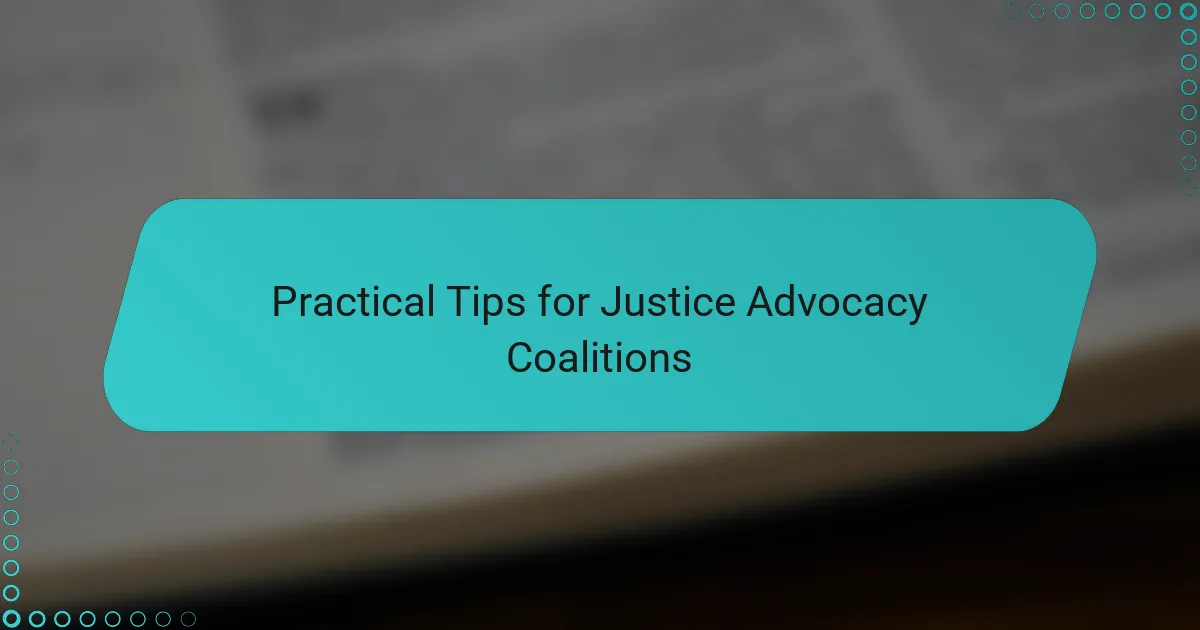
Practical Tips for Justice Advocacy Coalitions
One practical tip I always emphasize is establishing clear shared goals from the outset. In one coalition I was part of, early clarity kept us aligned through tough decisions. Have you ever been involved in a group where everyone wasn’t quite sure what success looked like? That confusion can drain momentum fast—so defining our common purpose gave us a compass to navigate challenges together.
Another lesson I’ve learned is the power of regular, honest check-ins. It’s tempting to put out fires only when they flare up, but consistent communication builds trust and catches misunderstandings before they grow. When I started prioritizing these conversations, I noticed our coalition felt less like a loose network and more like a cohesive team—doesn’t it feel better when you know your voice will be heard regularly?
Finally, don’t underestimate the importance of flexibility. Justice advocacy rarely follows a straight line, and being open to adapting plans saved us from stagnation more than once. I recall moments when pivoting based on new information kept our momentum alive. Have you ever seen a group crumble because it was too rigid? Staying adaptable helps coalitions respond to shifting realities without losing their core focus.
